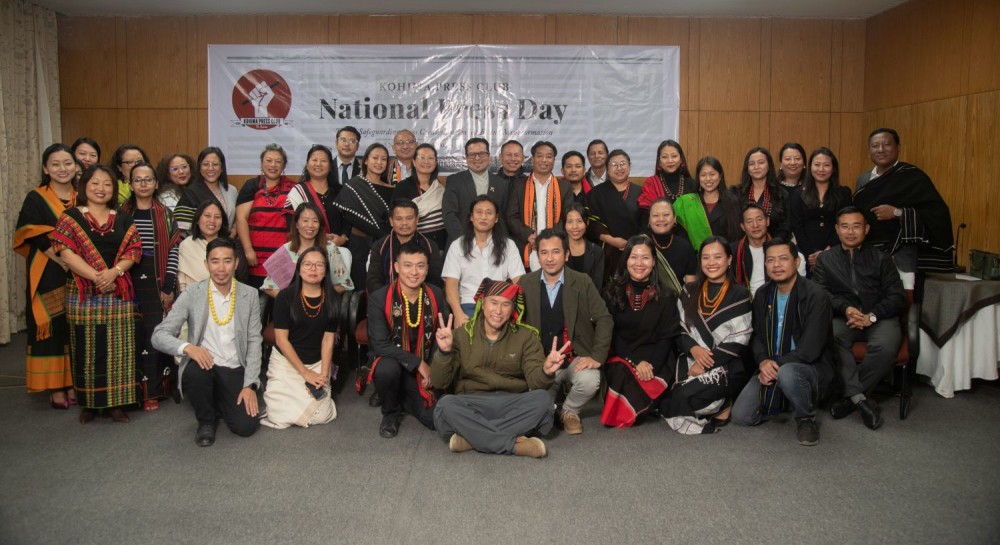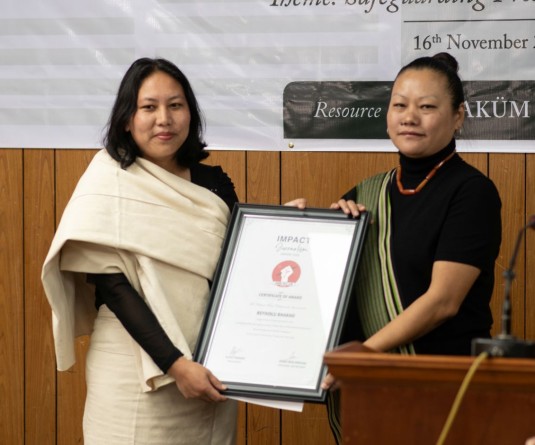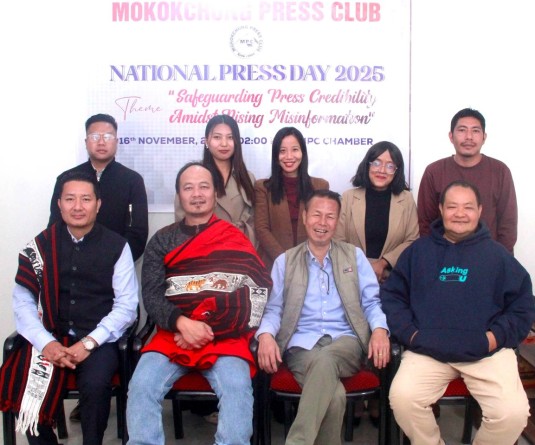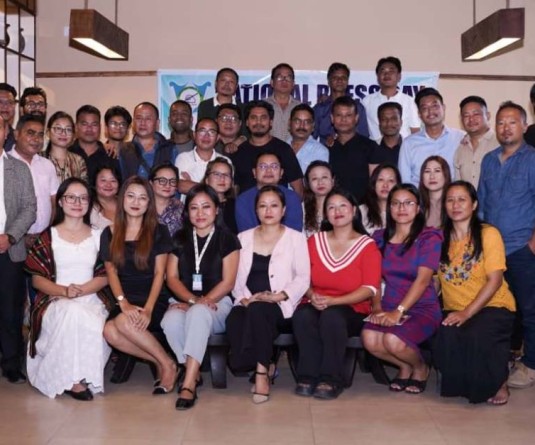Members of the Kohima Press Club with the theme speaker and others during the National Press Day organised by Kohima Press Club at Hotel Japfü Kohima on November 16.

Morung Express News
Kohima | November 16
“With prudence, the Naga media needs to engage with this question of who decides what is real. Because by implication it raises the practice of truth sovereignty which becomes a matter of soft power and real politik.”
These were remarks made by Dr Aküm Longchari, Publisher of The Morung Express on National Press Day organised by Kohima Press Club (KPC) under the theme ‘Safeguarding Press Credibility Amidst Rising Misinformation’ at Hotel Japfü Kohima on November 16.
Reflecting that the 21st century will be about who controls truth, he noted that, “ truth is reduced to a commodity to be owned, monopolised and controlled.” He said that, “by owning and weaponising truth, it has become militarised by real politik and reduced to a channel of confrontation and polarisation.”
“What then becomes of the truth which is based on facts and evidence with the capacity to connect, free, emancipate and heal?” he posed. Stating that truth in the Naga context is even more complex, he noted that, “the interplay of history, geography, and politics often veils the truth or gives rise to one based on a cognitive bias that breeds distrust.”
In such situations, he said, “fact-based truth becomes the first casualty and subjective feelings are perceived as the truth.” As a result, he said “it is people’s feelings that matter more than truth” and “the complex tensions between feelings and facts impact how the media operates.” He underscored that the challenge lies in how the media can build a bridge that narrows the gap between feelings and facts.
On the “dilemma of the power of context,” he highlighted that “journalism is about harnessing this power in order to build credible relationships and cultivate trust with its readers and viewers.”
He also dwelt on the Naga political question that is in a state of flux, with the situation offering a much-needed historical opportunity for the people to find ways to co-learn, think together and identify common solutions towards healing and reconciliation. Simultaneously, he said, “the market forces of globalisation and the 21st century notion of individualism have entered Naga life and culture.”
With Governance now more entrenched in patrimonial rule, evolving entrepreneurship, flourishing arts and music, increased mobility and local capacity building being fostered, he remarked that, “Nagaland is projected and curated as a unique tourist destination by a State-led tourism policy where people and culture are reduced to a living museum.”
Amidst this increasing mix of turbulence, contradictions and transformation, he underlined that “new narratives emerge to challenge the old.” With the Naga identity directly being impacted by many factors including increasing assimilation, greed and selfishness, consumerism and materialism, systemic corruption, State-centred development and the widening economic divide, he pointed out that, “all this is changing demography, inducing social fragmentation, identity-based polarisations, and instigating cultural shifts where the people are no longer makers of their own culture.”
“These changing power dynamics and transitional politics require the media and journalists, in particular, to be acutely aware of who is defining the narratives and for what purposes”, he said. He urged the Naga media to reflect on whether it has the moral courage to speak truth to power by rising above fixed positions, going beyond official statements, uncovering facts behind headlines, and investigating root causes by questioning power structures and policies. He said the media must move “from monologue to dialogue,” engage with context, and step outside its echo chambers to uphold its role as the fourth pillar of democracy.
Dr Longchari further called for celebrating that journalism is dynamic and needs to evolve with the shifting times. Highlighting that the 21st century should not be about who controls truth and decides what is real, he emphasized that “the media in Nagaland needs reimagining and redefining itself in these shifting times to become a credible and reliable identity with a responsibility to facilitate and even nurture critical thinking and consciousness through quality news.”
KPC General Secretary, Vishü Rita Krocha spoke about the KPC-NBOCWWB Media Fellowship while recalling that the only running media fellowship in the state was conceived and initiated in 2022 under the chairmanship of Dr Kekhrie Yhome. Under the fellowship, the media fellows have consistently proved the profound impact of storytelling as powerful mediums in educating and shaping minds in the society. Till date, there have been 14 media fellows from different districts of Nagaland spread across Kohima, Dimapur, Mokokchung, and Noklak.
“In these 4 years, altogether, our fellows have produced 58 extraordinary stories including visual and photo stories,” she informed.
Other highlights of the event included prayer by William Belho, Member KPC; special number by Athe Rhi, Member KPC; About the KPC Impact Journalism Award by Alice Yhoshü, President KPC; presentation of Completion Certificates by Er Vikeheto Naki, Deputy CEO NBOCWWB; sharing of fellowship experience by Chizokho Vero and Shongmo B; and vote of thanks by Sarah Naam, Member KPC; while Yirmiyan Arthur Yhome, Asia-Pacific Deputy News Director, the Associated Press & Member KPC chaired the programme.






